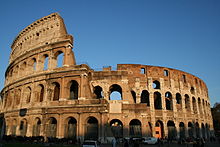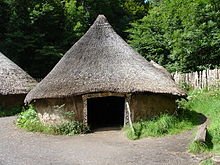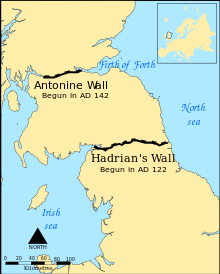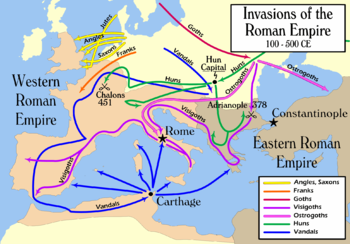After posting about Hadrian’s wall.
Link
I was asked a couple of questions.

I have decided to make a post so others can see the answers to two very good questions by @britishknights
Question one asked
Interesting. I've often wondered though, the might of the Roman Empire conquered many lands and people yet could not conquer the scots and instead built a wall? The energy used to build that wall and it's fortresses and the resources in both men and supplying those men could of been used to defeat them many times over, yet it wasn't. Was the wall to stop those to the North from going South, or was it so that others could not go North? What was in that area (Scotland) that was being protected?

My answer.
Unlike other European communities the Scottish highlanders lived in a very different society. They didn’t have a hierarchy system. No clan or tribe leaders and everyone, including the women (normal in Iron Age Britain) were equal. They even lived in one big house and all worked the land together.
The system of rule by the Romans started during the republic in the 6th Century BC. The small areas of the republic were run by a governor or military leader and answered to central Rome. This didn’t change much until Julius Caesar’s time when it changed to an Imperial system run by an emperor.
The system of conquering lands and setting the local leader up to continue running the district with the threat and ultimate rule by Rome under the guidance of a governor was the normal method of rule.
Although the Scottish did fight each other over land, they didn’t work together and Rome would have needed a governor for each clan.
This is why the Roman system didn’t work. The British tried a similar system 1000 years later and had similar problems, although by this time, the small clans had become large clans and things worked better. The British bought loyalty with coin and land.
The second question asked.
How many others did the Romans conquered that also did not have a heirarchy system? Did they build walls to keep them out of other lands too?
My answer
They only built two major walls. Hadrian’s Wall the The Antonines Wall, both on the Scottish border. Hadrian’s Wall worked for about 300 years with the use of the Antonine wall on several attempted invasions.

I do not believe the Romans built any other walls to separate the Empire from the Barbarians.
The other Barbarians causing major problems and eventually the end of the Western Roman Empire were the Germanic Peoples of Northern Europe. These migratory people were not made of one group, but many, with a common language. They were born fighters and even refrained from carnal pursuits until into their 20s so not to interfere with their training and warrior life.
They did very well at being led, but only when it came to defence or conquest, and did not do well at being ruled. Being migratory meant putting in place a system of tax collection and establishing a government didn’t last because they moved as the food and weather dictated.

Eventually the Germanic people in the form of the Angles and Saxons migrated to England and either conquered or integrated to form the English.
The Romans did built lots of walls, but normally around cities. The one around Rome was huge, but was still breached in 410AD by the Visigoths during the sack of Rome.
The Western Roman Empire lasted until 410AD but the Eastern Roman Empire managed another 1500 years.
The above answers are my own
As always, your posts on history are fascinating and really pique my interest. Looking forward to reading many more from you. Thank you for sharing. :)
Downvoting a post can decrease pending rewards and make it less visible. Common reasons:
Submit
Question 1
During the Roman rule, Scotland refers to the historical period under the rule of the Roman Empire, now known as Scotland. The first Romans came to Rome in 71 AD and defeated the Celtic tribes in Britain.
The Romans, commanded by Gnaeus Julius Agricola and Quintus Petillius Cerialis, who decided to take the island they had named Albion, won an important victory at the Battle of Graupius Mountains in 84 AD. Although Hadrian's Wall and the Antoninus Wall in its north have been tried to be acquired, Roman dominance has never been effective in modern Scotland. After 221 AD, it became an insignificant force in the region.
Question 2
The Antoninus Wall had its objectives besides defending against the attacks of the Caledonian. The Maeatae tribe between the two walls was cut off from the other Celts and a buffer zone was formed in the north of Hadrian's Wall. However, Rome's success is short-lived, with 12 years of built-up fortification being overrun and abandoned in 160 AD. Constructions that are a source of prestige for a period are left to their fate when they have completed their useful life.
There was no indirect benefit such as the collection of military intelligence on the wall, which is the most important defense, and the collection of customs tax. This fortress, which gave fear to the enemies by the scale, was also a demonstration of the prestige of Rome. The Wall separated the Romans and the Celts in Britain until AD 139. Antoninus Wall has taken his place for a short time.
Source: https://ipfs.io/ipns/en.wikipedia-on-ipfs.org/wiki/Roma_egemenli%C4%9Fi_d%C3%B6neminde_%C4%B0sko%C3%A7ya.html
Downvoting a post can decrease pending rewards and make it less visible. Common reasons:
Submit
Q1
I am not really sure how your answer explained why the Picts could not be subjugated by the Romans.
Q2
Hadrian’s Wall was started sometime around 117AD and completed around 128AD. It was in use until the fall of the Empire in 410AD. It had its peaks and troughs of use during this period whether behind the lines or as the northern defensive line. It also got over-run at times.
Thanks for your input.
Downvoting a post can decrease pending rewards and make it less visible. Common reasons:
Submit
your posts on records are fascinating and surely pique my interest. looking forward to studying many greater from you. thanks for sharing. :)
Downvoting a post can decrease pending rewards and make it less visible. Common reasons:
Submit
Thanks for reading. I normally get interested in events I have my own questions about.
Downvoting a post can decrease pending rewards and make it less visible. Common reasons:
Submit
Your Most of Welcome dude. Aww
Downvoting a post can decrease pending rewards and make it less visible. Common reasons:
Submit